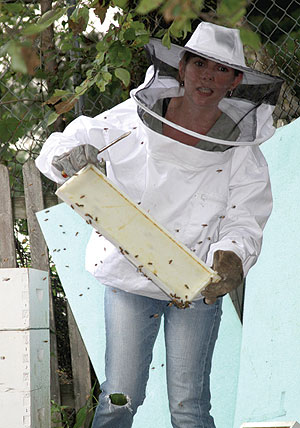
How sweet it is, and sticky, too. The prototype beehive at the Somerville Community Garden is adding a new dimension to the Growing Center’s diverse repertoire of activities. - Photo by Harry Kane
By Harry Kane
The Somerville Community Garden hosted an informal seminar on National Honey Bee Day to share factual information on the joys and challenges of beekeeping. The Growing Center is a microcosm of an agricultural setting and the bees are a new and important part of the garden. Emma Oster is a beekeeper at the Growing Center and she expressed her fondness for the industrious insects. “I love bees and I think that the most important thing for people to know is that they are not bad and that you shouldn’t be afraid of them.” Of course, that is unless you are allergic to bees, in which case it is advisable that you should avoid them.
According to the National Honey Bee website, Honey Bees pollinate up to one third of all fruits and vegetables. They are directly or indirectly responsible for up to 80 percent of the planet’s food supply. And, while Einstein did not say that the human race would become extinct if all the bees died out, many experts agree that there would be serious consequences for our environment if the bees disappeared.
“I grew up on a farm in Maine and we had bees. It was always my favorite aspect of farming,” Oster remembered. “I loved the bees and loved to maintain them, doing work on the hives and harvesting the honey.” The Somerville Growing Center has given Emma an opportunity to incorporate bees into her life again.
Initially, the beehive was installed last year and the bees died over the winter, probably because they were buried in snow,” Oster explained. “Now that we know that the snow was the issue we’re gonna keep a better eye on it. We installed the new colony this spring and they are doing really well. The beehive is now sitting on a wooden platform, jacked up to protect it.” The front door, where the bees came in and out, may have been blocked by snow and this year the issue will be averted by constant supervision of the hive.
Following last year’s demise, the head beekeeper, Kamal Hadidi, ordered a Nuc, or nuclear hive, which contains a colony of bees (up to 10,000 bees). The Nucs are delivered in the mail, are made of cardboard, and weigh three pounds. The Nuc includes 4-5 frames of happy bees ready to work for their hive. It can take a few months before honey is ready to be harvested. They’ll need gallons of sugar over the coarse of the first month to maintain their colony.
The bees at the Growing Center are Russian Bees. While the most common bees in the U.S. are Italian Bees, the Russian Bees were selected because they do better in colder climates and because they are less likely to swarm. Swarming means that they are not as likely to fly away to another nearby area like a tree, leaving their hive.
“Having a beehive at the growing center is a new thing so we’re not really sure yet how to incorporate it into the programming. We have some plans for children’s programming to get kids thinking about bees and we’ll probably have some bee related activities around our harvest fest,” Oster revealed.















Reader Comments